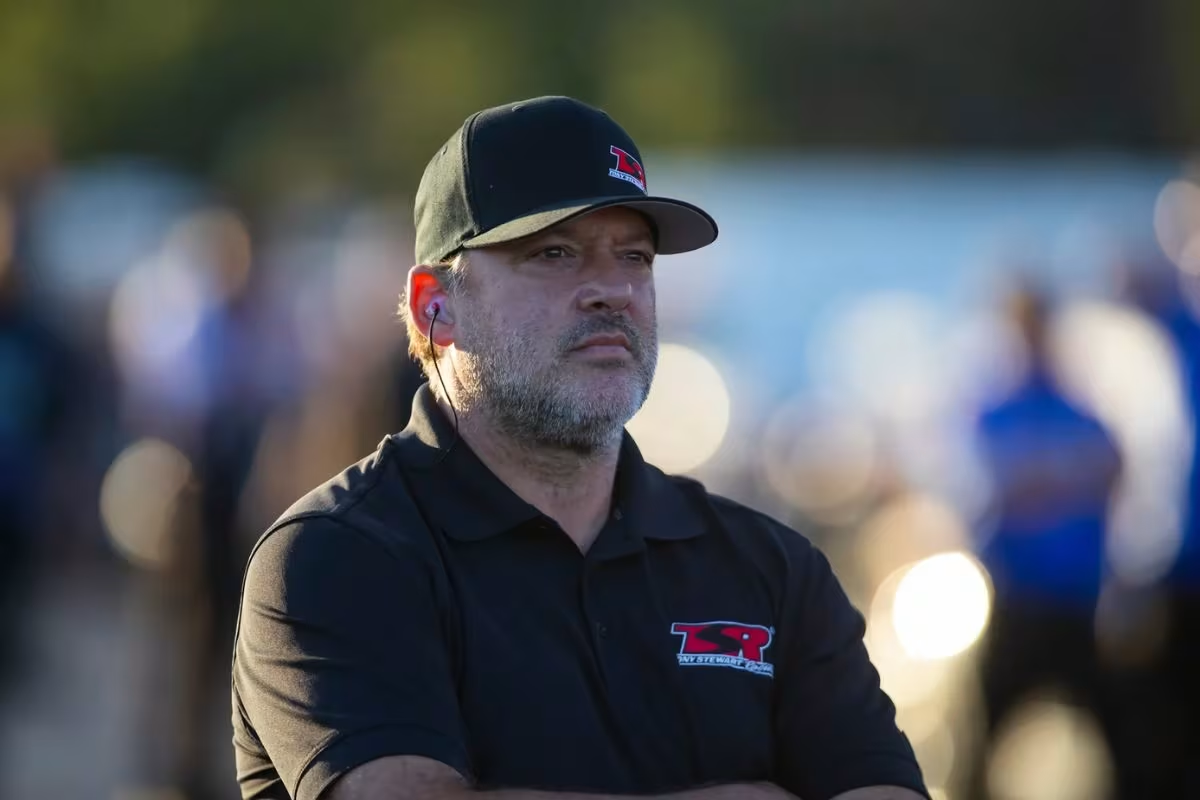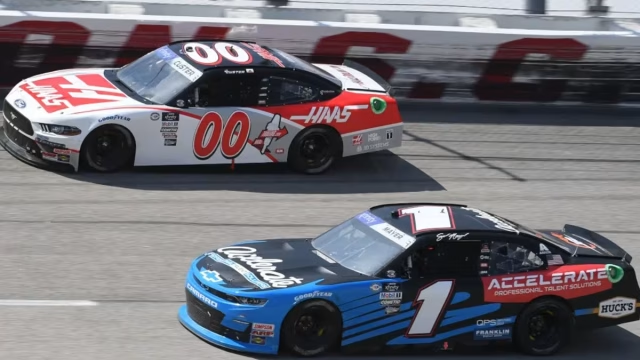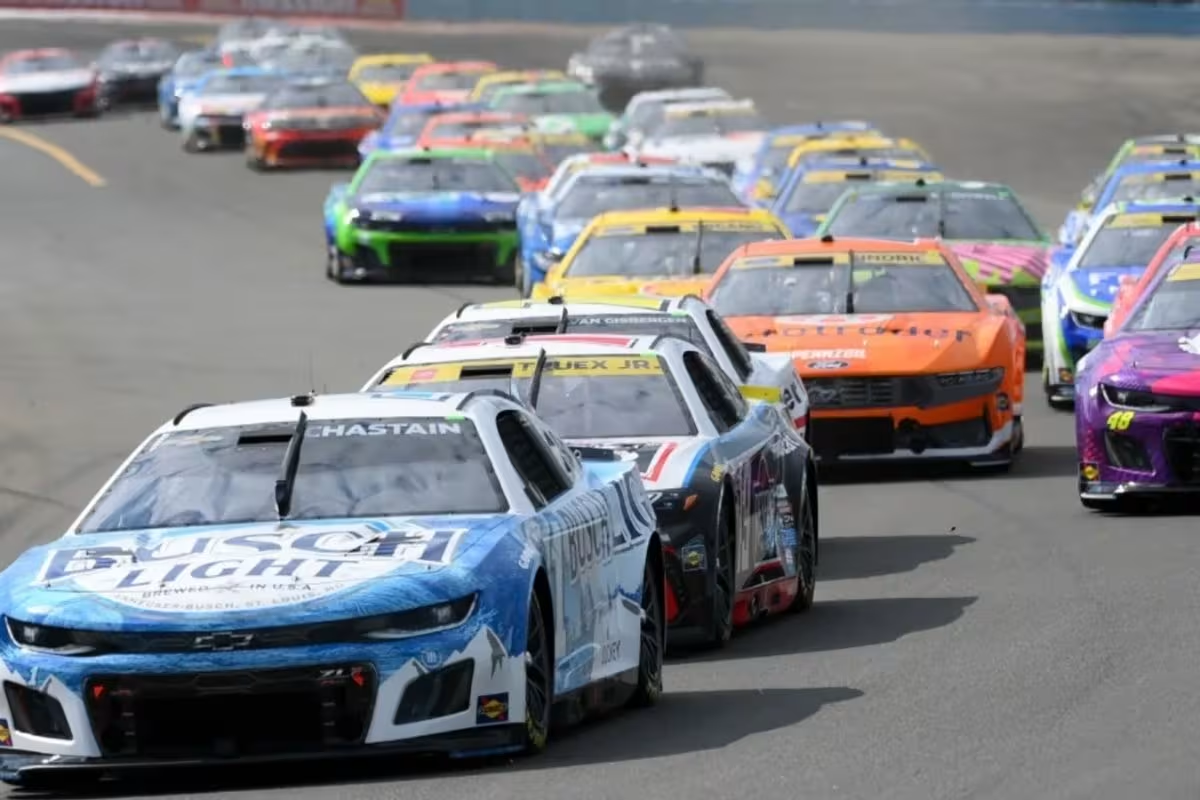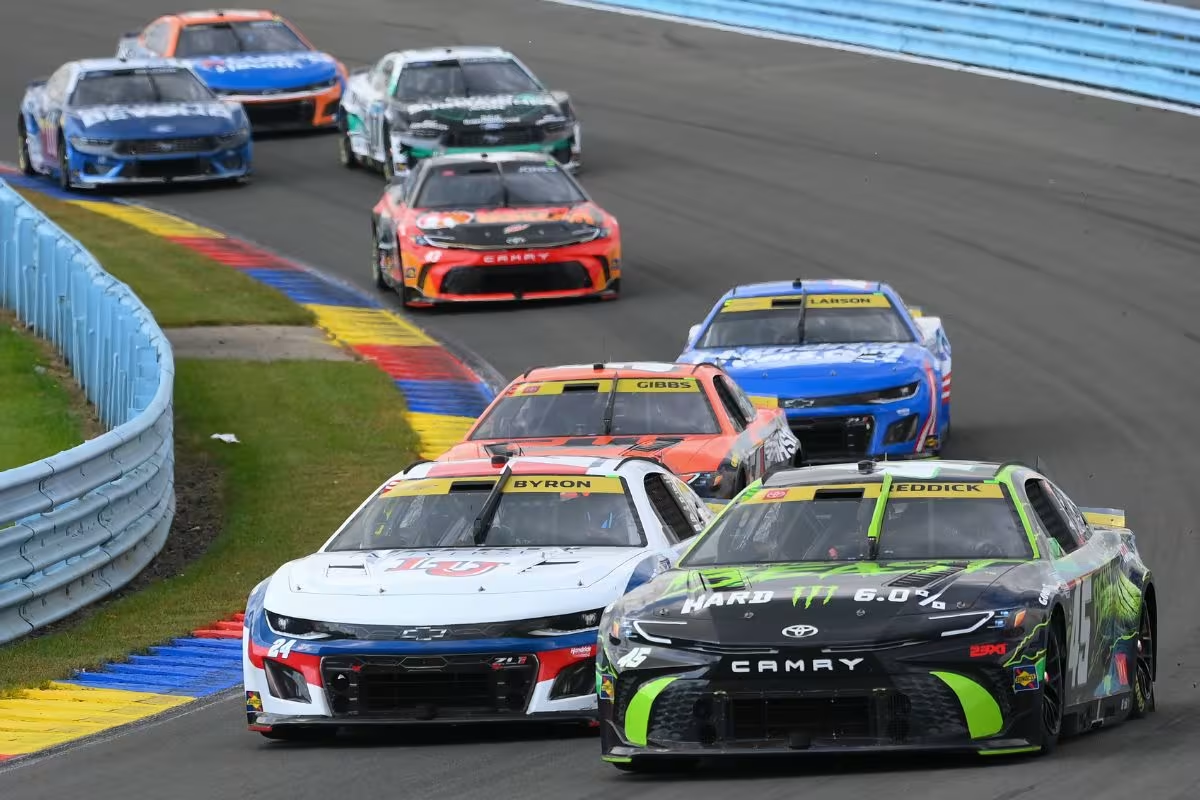Stewart-Haas Racing’s survival at stake as NASCAR’s charter deal becomes more complicated. With only 13 teams holding charters and legal battles adding pressure, Stewart-Haas Racing faces serious challenges. Financial strains and the race to secure charter agreements have put their future in doubt. The rising value of charters and market shifts are key factors, and losing or dissolving charters could spell disaster for the team. This situation demands urgent attention, as NASCAR’s changing landscape threatens the stability of teams like SHR. More challenges lie ahead, and the outcome is uncertain.
Key Highlights
- Stewart-Haas Racing (SHR) faces existential threats due to unresolved legal disputes related to NASCAR’s charter system impacting financial stability and operational viability.
- The charter deal’s complexity and limited signing window have led to anxiety among teams, with only 13 successfully securing charters, jeopardizing SHR’s future.
- Financial concerns mount as SHR’s charter valuations hover around $25 million, complicating revenue reliability and negotiations essential for team survival.
- Ongoing shifts in NASCAR’s competitive structure and team ownership dynamics raise questions about the long-term sustainability of established teams like SHR.
- The push for financial reform and equitable practices in NASCAR aims to address the challenges faced by teams, including SHR’s precarious situation.
2024 Cup Series Silly Season
The volatility of the Cup Series Silly Season has once again highlighted the precarious nature of team dynamics within NASCAR. What began in 2024 as a seemingly benign reshuffling of drivers rapidly escalated into a situation of notable concern, particularly with the public announcement by Tony Stewart regarding the impending closure of Stewart-Haas Racing. As a storied team with 70 Cup race victories, its demise serves as a striking reminder of the inherent vulnerabilities within the NASCAR framework.
The Silly Season, typically characterized by driver movement and team restructuring, took a dramatic turn when Stewart’s decision illuminated the systemic faults of NASCAR’s operating model.
This season’s developments have sparked intense scrutiny over the sustainability of competitive operations, as financial viability becomes increasingly precarious. Stewart’s struggle for survival is further complicated by Michael Jordan’s escalating legal battles, which indicate a growing rivalry over the distribution of resources and competitive equity among teams.
Consequently, the 2024 Silly Season has transcended its traditional role of merely charting driver changes; it has transformed into a critical examination of NASCAR’s structural integrity.
Challenges Faced by Teams in the Charter Deal
Steering through the complexities of the recent charter deal has proven to be a notable challenge for many NASCAR teams. The abruptness of the six-hour signing window left many organizations scrambling to make critical decisions under stress. With only 13 teams opting to sign the charter, a considerable portion of the paddock expressed anxiety over the potential dissolution of their charters, creating a climate of uncertainty.
This rushed timeline has not only exacerbated tensions among teams but also raised questions about the long-term viability of their operations. The distinct divergence in responses to the charter deal highlights the varying approaches among teams. While 23XI Racing and Front Row Motorsports chose to resist the terms, engaging in a broader conflict with NASCAR, the majority opted for compliance, albeit with concerns about their autonomy.
NASCAR just filed response to preliminary injunction motion. Some quick notes:
-New charter deal is 7 yrs ww/possible extension.
-Neither 23XI nor FRM has submitted a request yet for a charter transfer from SHR.
-NASCAR plans for a season with 32 charters and eight open positions— Bob Pockrass (@bobpockrass) October 24, 2024
Moreover, the implications of the charter deal extend beyond immediate financial considerations. Teams are now tasked with maneuvering a landscape where their futures hinge on a rapidly evolving set of rules and agreements.
The necessity for tactical foresight has never been more critical, as the choices made today will certainly resonate in the future.
Tony Stewart’s Profit Concerns
Amidst the turmoil surrounding the charter deal, Tony Stewart’s profit concerns have emerged as a vital focal point for Stewart-Haas Racing (SHR) and the broader NASCAR landscape. The potential demise of SHR has raised alarms within the Cup Series garage, particularly regarding the value and distribution of charters, which are essential to a team’s financial stability.
In recent months, several teams have scrambled to negotiate deals with Stewart for his charters, emphasizing the urgency of the situation. The discussions surrounding the charter transactions have taken center stage, with teams like Front Row Motorsports (FRM) publicly announcing their purchases while others, such as 23XI Racing and Trackhouse Racing, remain in a state of uncertainty.
The ongoing speculation regarding potential sales and the general market dynamics of charters reflect not only the immediate profitability concerns for Stewart but also the long-term health of his organization.

Legal Battles and Implications for Teams
Legal disputes have intensified within the NASCAR framework, significantly impacting team dynamics and operations. The ongoing litigation surrounding the new charter deal poses considerable challenges for teams like Stewart-Haas Racing (SHR), as they navigate a landscape increasingly fraught with legal complexities. Notably, the anticipated acquisition of charters by teams such as 23XI and Front Row Motorsports (FRM) remains stalled due to these legal entanglements.
NASCAR’s recent filing in response to a preliminary injunction highlights the urgency of these issues. The charter system, which spans a seven-year term with potential extensions.
“NASCAR just filed response to preliminary injunction motion. Some quick notes: -New charter deal is 7 yrs ww/possible extension. -Neither 23XI nor FRM has submitted a request yet for a charter transfer from SHR. -NASCAR plans for a season with 32 charters and eight open positions.”-(bob pockrass)
As it stands, neither 23XI nor FRM has formally requested a charter transfer from SHR, indicating a hesitancy to engage in negotiations amid legal uncertainties.
The implications of these legal battles extend beyond individual teams; they threaten the broader structural integrity of NASCAR. With plans for a season featuring 32 charters and eight open positions, the fluidity of charter ownership is vital.
The absence of clarity in ownership transfers and the potential for protracted legal disputes may lead to an unstable environment, where teams struggle to maintain competitive parity.
NASCAR just filed response to preliminary injunction motion. Some quick notes:
-New charter deal is 7 yrs ww/possible extension.
-Neither 23XI nor FRM has submitted a request yet for a charter transfer from SHR.
-NASCAR plans for a season with 32 charters and eight open positions— Bob Pockrass (@bobpockrass) October 24, 2024
The Future of NASCAR and Team Owner Perspectives
The future of NASCAR hinges on the evolving dynamics between team owners and the charter system, which has become a focal point of dispute among stakeholders. The recent sale of charters, such as Furniture Row Racing‘s charter for $6 million and Spire Motorsports‘ subsequent purchase of another for $40 million, emphasizes the volatility and uncertainty within the market.
As whispers circulate regarding Stewart-Haas Racing‘s charters potentially valued around $25 million, the looming threat posed by 23XI Racing‘s campaign against the charter system casts a shadow on these estimates.
“The charter agreement needs to be better than what it is certainly before I invest any more money in it.”-(denny hamlin)
Denny Hamlin’s assertion that the charter agreement requires considerable improvement before further investment demonstrates a growing consensus among team owners, reflecting dissatisfaction that has historical roots. NASCAR’s long-standing structure, which has often favored the France family’s control, has left even successful teams grappling with financial instability.
The plight of Ricky Rudd, whose legacy ended in a distressed sale, serves as a striking reminder of the risks involved.
However, the momentum for change is visible, led by figures like Michael Jordan and his allies who seek to alter NASCAR’s financial landscape. As drivers such as William Byron and Kyle Larson express optimism for a more prosperous future, the current legal battles may pave the way for a more equitable system.
“I’d like to see our sport be more prosperous. In watching other professional sports and where we could be, I am excited for that. So hopefully that comes to fruition.”-(william byron)
“Obviously, we would love to see it trend upward instead of the opposite. But the teams probably have to make a lot more money to make it viable to pay the people who are working for their organizations. ”-(kyle larson)
“This is huge for our sport no matter what happens. It’s obviously big because we’ve never seen it before.”-(joey logano)
Joey Logano’s acknowledgment of the unprecedented nature of these developments highlights the potential for a groundbreaking shift, even if it comes at the expense of established teams like Stewart-Haas Racing.
News in Brief: Stewart-Haas Racing’s Survival at Stake
The challenges posed by NASCAR’s charter deal greatly impact the viability of teams such as Stewart-Haas Racing. Profit concerns articulated by team owners, including Tony Stewart, highlight the financial strain affecting operations. Ongoing legal battles further complicate the landscape, posing risks to team stability. As the future of NASCAR unfolds, the perspectives of team owners will be essential in steering through these turbulent waters, ultimately determining the survival and competitive balance of the sport.
ALSO READ: Stewart-Haas Racing Battling For a Lifeline as Gene Haas Demands Charter Approval


